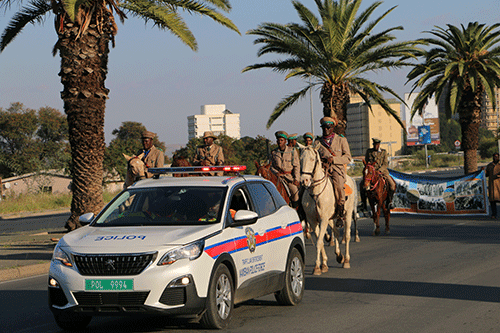Former Swanu president and descendant of the 1904/08 Herero/Nama genocide, Usutuaije Maamberua, has called for the immediate enactment of a genocide memory law that will help preserve and protect the memories and integrity of the genocide victims and descendants.
Naturally, a memory law, such as the one being proposed by Maamberua; acts as a legal provision governing the interpretation of historical events and showcases the legislator’s or judiciary’s preference for a specific narrative about the past.
As part of the process, competing interpretations of the historical event may be downplayed, sidelined or even prohibited under such laws and those found guilty of misrepresenting or denying important historical events sometimes face criminal charges.
Maamberua made these remarks during the weekend’s commemoration of the much-anticipated National Genocide Remembrance Day, which honours the victims of the 1904/08 genocide.
Members of the Ovaherero, Ovambanderu and Nama communities on Saturday gathered in their hundreds at the UN Plaza in Windhoek to officially mark the day.
According to the veteran politician, not only will the genocide memory law preserve the importance of historical events around the genocide but will also contribute to the establishment of genocide memorial sites.
It will preserve memorial sites found on private property and will also contribute to the establishment of a national museum for the 1904/08 genocide.
“Under such a law, we will be able to reject any deliberate pro-fascism, genocide denial or pro-German Reich display in support of genocide or similar acts, and those found guilty will attract fines and other punishments. Also, the genocide memory law will promote the exhumation of the remains of the genocide victims for a dignified and befitting burial at proclaimed genocide memorial sites,” he stated.
“It [the law] will facilitate the creation of a national census, a map of graves, and a proper DNA bank of the various victims. Not just that, but the genocide memory law will provide for the automatic eligibility of Namibian citizenship to the descendants of the genocide, who are still languishing in the diaspora as a result of the war. I, therefore, call for the immediate enactment of such a law, as that will be a step in the right direction. We still have a long way to go in this fight but that will be one important step to take.”
The weekend’s festivities, which started Friday and ended Sunday, were organised by the technical committee of the Okandjoze Chief Assembly on the 1904-08 Genocide, to mark the inaugural commemoration of 28 May as the National Genocide Remembrance Day. The day will be celebrated on 28 May of each year, the committee said.
Although the day is yet to be officially gazetted by government, the technical committee said they want to continue keeping the relevance and importance of the genocide issue alive while waiting for the requisite gazetting of the Genocide Remembrance Day by government.
In 2016, Maamberua moved a motion in parliament for 28 May to officially be declared and recognised as the National Genocide Remembrance Day, because it was on 28 May 1908 when the genocide against the Nama and Ovaherero ended and all concentration camps were officially ordered to close in Namibia.
Maamberua’s motion was followed by countrywide consultations, and subsequent tabling of a report by parliament’s Legal and Constitutional Committee, which recommended that 28 May be adopted as the official day for the National Genocide Remembrance Day.
The committee’s report was wholly and unanimously agreed upon in 2020 by the August House, but government is yet to officially gazette and declare the day a national public holiday to observe and pay homage to the victims of the first genocide of the 20th century.
The activities also featured an exhibition by the National Heritage Council on the genocide, traditional dances, panel discussions, a night vigil and a procession from the UN Plaza through Independence Avenue to the Alte Feste in town on Sunday for a wreath-laying ceremony in memory of those who perished in the German concentration camps during the genocide.
ohembapu@nepc.com.na


